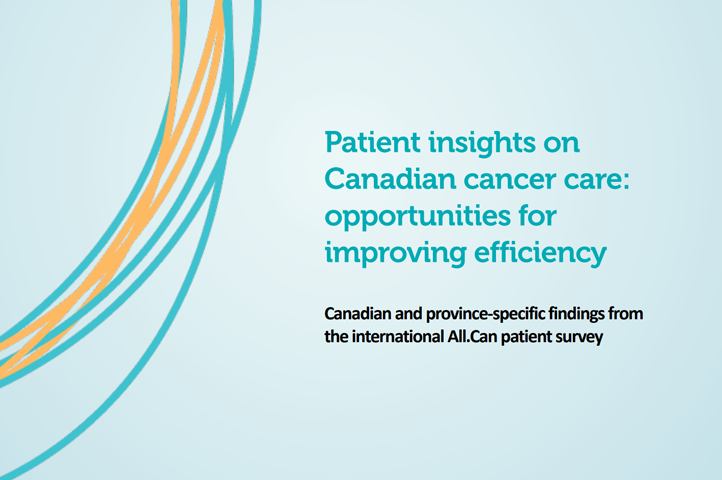
The Canadian All.Can cancer initiative has this month published a major report of cancer care recommendations based on patient insights following a Canada-wide patient survey conducted last year that gathered insights from cancer patient. Of the 314 responses received, 255 of these were selected for a provincial analysis comparing results from British Columbia, Alberta, Ontario and Quebec.
The report, Patient insights on Canadian Cancer care: opportunities for improving efficiency, highlights four major areas of cancer care inefficiency from the patient perspective. All.Can defines inefficiency in cancer care as anything that does not focus on what matters to patients.
“Patients are almost never included in conversations about cancer care. We need to listen to what patients say would improve their experience of care,” said Kathy Barnard, who is a stage IV melanoma survivor, Founder of Save Your Skin Foundation, and a member of All.Can international’s steering committee. “Ignoring the findings of this report would be a missed opportunity to do the right thing by patients and make changes that could make a real difference,” said Barnard.
The cost of cancer care in Canada has risen steadily from $2.9 billion in 2005 to $7.5 billion in 2012. There is an urgent need to improve efficiency and reduce waste in cancer care in Canada. Improving efficiency is not a
question of linear cost-cutting, but of finding ways to allocate resources more efficiently to achieve better health outcomes for patients.
The report identifies four key areas for improvement based on patient insights. Below are a selection of highlighted findings from the survey report:
1. Ensuring a swift, accurate and appropriately delivered diagnosis
- Diagnosis was the top area where Canadian patients reported the greatest inefficiency throughout their
cancer care and treatment (30%). - One in four respondents (27%) said that their cancer was diagnosed as something different – either initially
or on multiple occasions. - One in seven respondents (14%) had to wait for more than a year to be diagnosed with cancer. For
respondents from Quebec, this number was one in five (21%).
2. Improving information-sharing, support and shared decision-making
- Half of Canadian patients (49%) felt they were not given adequate information about their cancer care and treatment in a way they could understand. This was highest among respondents from Quebec with two thirds (65%) reporting they were not given adequate information in a way that they could understand.
- Over half of respondents (53%) felt they had inadequate support to deal with ongoing symptoms and side
effects. - Nearly half of respondents (47%) felt inadequately informed about how to recognize whether their cancer
might be returning or getting worse.
3. Making integrated multidisciplinary care a reality for all patients
- Only one in five respondents from Quebec (20%) said they were always able to access support from allied health professionals such as dietitians, physiotherapists or mental health providers, compared to 59% of respondents from British Columbia and 41% of all Canadian respondents.
- Over two thirds of respondents (69%) who felt they needed psychological support during or after their cancer care said it was only available sometimes or not available at all.
4. Addressing the financial implications of cancer
- Of those who paid for part of their cancer care, nearly half (47%) paid for drugs.
- Two thirds (67%) of respondents from Ontario reporting having to pay for cancer drugs.
All.Can Canada urges policymakers and the entire cancer community to act on these findings – as making these changes could make a real difference to patient outcomes and experiences of care, and the financial impact cancer has on patients, families, the health system and society as a whole.
This is supported by existing evidence: faster diagnosis can improve patient survival and is associated with reduced treatment costs for many cancers. Shared decision-making is associated with improved patient outcomes.
To download a full copy of the report, Patient insights on cancer care: opportunities for improving efficiency, click here.